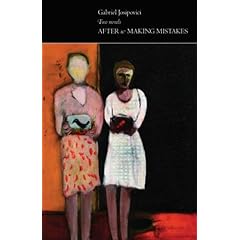
After & Making Mistakes, By Gabriel Josipovici
In his 2007 lecture "What ever happened to Modernism?", Gabriel Josipovici argued "the trouble with novels is that the only meaning they can have is that conferred on them by their authors". He added, "but what authority do they have to confer meaning? None, is the answer." He has been addressing this largely ignored Achilles' heel in a career that spans over 30 works of fiction, theatre and critical theory, in which he repeatedly calls for this "bad faith" of the novel to be acknowledged by authors and critics.
Josipovici's two new novellas, published in one beautifully produced book, are fine examples of a mode of fiction that does away with the "bad faith" of "meaning". They are written in the fragmented, action/dialogue-led style he has made his own, though applied this time with a lighter, semi-comic brio. This is a dialogue of action savvy enough to reveal that even a narrative of fragmentation retains its centre. In this case, it's an unnerving quiet despair, meaninglessness and charming politeness that is unmistakably British.
After is a fiction of conversations. Alan, an academic writing a book about François Rabelais, is rattled by the appearance of an ex-lover, Claude, whom he hasn't seen for over 15 years. Claude, who insists on calling him "Alain", is desperate to discuss a pivotal moment from their past, a car accident, that somehow marked the end of their relationship. This shared trauma is explored through the architecture of memory and repetition, where outcomes of the same event blur into a miasma of vacillation. The repetition of pithy exchanges between Claude and Alan/Alain, where the car crash is relived in a series of flirtatious provocations, wheel throughout the narrative as a reminder that it is fiction's possibilities at play and not any concrete actuality. This is a work of fiction after all. Yet the remarkable thing is that meaning is somehow created out of nothing. This lightness of touch, where each fragment of memory seeks its own alternative explanation, begins to show us the psychological complications of each character.
Continuing this lighter touch, Making Mistakes manages to make infidelity and separation strangely amusing through a series of polite and comic tête-à-têtes, mostly about relationships. An insouciant re-working of Mozart's opera Così fan Tutte, the novella centres on a group of middle-aged intellectuals. Charlie is cheating on his partner Bea, whose sister Dorothy is married to Tony, who in turn leaves his fiercely intellectual wife for his plain and "boring" secretary.
While Bea and Charlie project themselves as the classic "open" couple, Dorothy and Tony project a more outwardly harmonious union. The spanner is thrown into the works when Alfonso, a guest at Dorothy and Tony's dinner party, reminds everyone of a "little experiment" while they were all at university 15 years ago. It appears that Alfonso had orchestrated them to swap partners temporarily.
What follows is a comedy of decisions and accidental meetings, relayed in snappy, amusing dialogue which gradually unfolds into a parable for modern living. In both novellas, Josipovici has created a modern fiction that "feels caught between the pointlessness of mere surface and the pointlessness of mere depth", creating a space of endless discovery.
[original source: The Independent, Friday, 16 October 2009]
*
